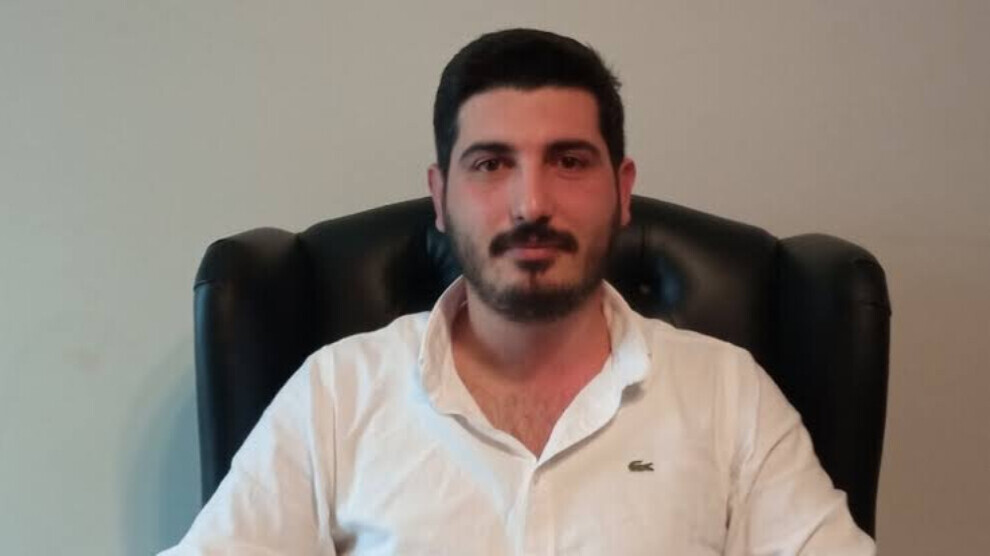Hakkari MP Onur Düşünmez criticizes new "Espionage Law," calling it an extension of censorship
Hakkari MP Onur Düşünmez criticizes the new "Espionage Law," calling it an extension of censorship.
Hakkari MP Onur Düşünmez criticizes the new "Espionage Law," calling it an extension of censorship.

Onur Düşünmez, Peoples' Equality and Democracy Party (DEM Party) Hakkari (Colemerg) MP, criticized the recently approved "Espionage Law" during a commission meeting, describing it as a continuation of the previous censorship laws aimed at suppressing opposition.
The law, previously removed from the 9th Judicial Package and commonly referred to as the "influence agent" regulation, was reintroduced in parliament under the name "espionage regulation" and has now been approved. MP Düşünmez talked to ANF and highlighted the numerous technical flaws within the bill. He argued that its primary objective is not to protect national interests but to intimidate and terrorize individuals.
Düşünmez expressed concerns that the law would be used as a tool for political repression, rather than for genuine national security purposes.
Name change
Düşünmez said that the renaming of the law "is merely a rebranding of its original intent." He pointed out that the ruling AKP party previously aimed to silence the free media through the disinformation law and is now attempting to further escalate restrictions with the espionage clause. Düşünmez stated: "The purpose behind introducing this clause is to isolate all forms of opposition in society. They want to silence civil society organizations, the free media, and human rights defenders, from the outside world. It is a law designed to prevent any opposition against the AKP-MHP regime."
The DEM Party MP added: "The clause is riddled with technical flaws, ignoring fundamental principles of the penal code such as clarity, proportionality, and constitutional standards. According to the law, any act against the strategic interests of a state or organization can be prosecuted as espionage. However, there is no clear definition of what constitutes these 'strategic interests.' In the commission, we argued against the lack of clarity and proportionality. They justify it by claiming that the law targets individuals engaged in espionage activities for foreign countries while operating within our borders. However, this clause does not align with their stated goals. It is essentially an extension of the censorship law and a mere rebranding of the previously proposed 'Influence Agent' law."
Düşünmez underlined that the lack of specificity in the legislation could lead to broad and arbitrary use, effectively silencing any form of dissent or criticism directed at the current government.
They want to isolate social opposition
Düşünmez, who drew attention to the fact that this regulation is open to too many interpretations despite the fact that all the commission members are lawyers, explained that there are serious problems regarding those implementing the law. He said: "We are talking about a level where the judiciary is so dependent and the state terrorizes people. The aim is to prevent the social reflexes that may develop against the AKP-MHP. To suppress social opposition as a whole. Again, to ensure that human rights organizations and other activists working in the universal arena or associations working with these and similar goals are isolated from the outside world."
The article is unconstitutional
Düşünmez said that they believe that the Constitutional Court will not accept this article either and added: "Taking it to the Constitutional Court is a situation that is monopolized by the main opposition party. They had said in the commission that the CHP would take this article and the entire omnibus bill to the Constitutional Court. We have such an expectation in the works in the General Assembly. If it passes in the General Assembly, it will be taken to the Constitutional Court, and we believe that the Constitutional Court will definitely not accept this regulation. The article is both unconstitutional, against the fundamental principles of criminal law and against their own criminal law.
They also stipulate the following; permission will be given to the Ministry of Justice, which is an executive authority, during the prosecution phase. This shows that no prosecution permission will be given for situations that develop in their favor, news made by their supporters, budgets received by their own associations, etc., but it stipulates that if someone from the opposition develops in such and similar situations against them, they can directly prosecute them with the name of the Ministry of Justice. This is a regulation that violates the independence of the legislature, which is actually against the constitution."
A way to punish the opposition media
Düşünmez continued: "If a press employee obtains information from abroad, say about an account situation of the Erdoğan family in Mali or the situation regarding the illegal work and transactions of a company in America there, or the bribery issue they recently carried out at the Turkish House, since the source is foreign, the opposition press, the free press will immediately be penalized within the framework of this law. Let me give an example from the Human Rights Association: if they receive a budget from abroad and conduct an event, organization or education campaign domestically, the AKP will again penalize the relevant organs of these associations within the framework of this law, since they are opposition associations."